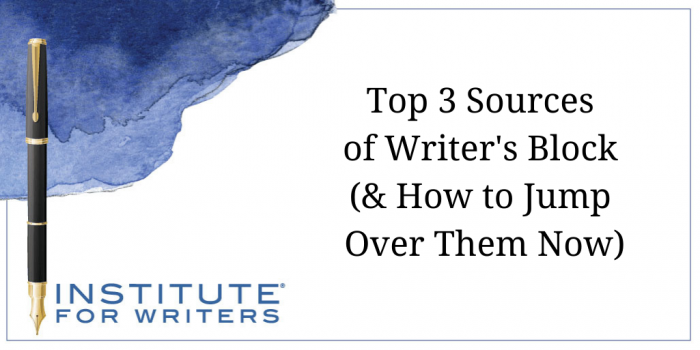1000 N. West Street #1200, Wilmington, DE 19801
© 2024 Direct Learning Systems, Inc. All rights reserved.

We teach our students how to write and get published!
View our Course Catalog >
At some point in a writer’s career, most struggle with writer’s block. If this is something you run into often, or if you’re struggling with an upsetting, first-time creative-brain hindrance, here are three usual culprits and how to overcome them.
Have you left your home lately? If not, get outside and away from your keyboard! I’m stealing this tip from Brandon Sanderson, but I’ll expand it a bit: try new things. Here are some ideas to get you started:
• New experiences: like ax-throwing, canoeing, or an escape room.
• New foods: new restaurant, recipe, or even an interesting fruit you’ve been curious about.
• Explore new places: hiking, biking, urban centers, a wine tour, or anything away from your usual haunts. Entrepreneur Magazine (because all writers are entrepreneurs) suggests changing your environment to spur creativity.
• New genre: watch a movie or read a book outside your favorite genre.
How to overcome this stumbling block:
This one is fun. Just get away and try something new. This is tricky if you’re on a tight deadline for your next book or article. If that’s the case, try circling back to Brandon Sanderson’s original tip and simply get outside. Even a walk around the block is proven to improve brain function.
This category encompasses so much, I’ve broken it down into two sub-sections:
1. Writer lifestyle.
2. Writing craft.
Lack of Structure in Your Writer Lifestyle
“If the muse is late, start without her. You don’t give yourself airs because you’re an artist. You’re a worker.” – Peter Beagle, World Fantasy Award, Hugo, and Nebula award winning novelist
Train creative sparks to show up on your schedule, not theirs. Some creatives treat their brains like Pavlov’s dog, ringing a bell before each writing session so that eventually, when they hear the bell, their brain quickly switches over to “creative-brain” time. Not many writers actually employ a bell, but it illustrates a point. Regularly write, and the muse will learn to show up, not the other way around.

How to overcome this stumbling block:
Have a writing appointment literally scheduled onto your calendar. Turn off your phone, your social media, don’t check your bills, nor your email. Do not schedule appointments during these hours. Only write/edit. If at all possible, write during a peak “alert time” during your day. If you’re doing this right after lunch and you’re always tired and sluggish, you might try moving your daily tasks to accommodate a different writing time.
Lack of Structure in Your Actual Writing
Lack of structure, in this article, means the writing is broken somewhere. Aka: you’ll need craft skills to fix it. Here are common symptoms when the structure/craft isn’t working properly:
1) “I’m bored with my own writing. And my reader will be bored, too.”
2) “There’s something wrong with the story and I can’t put my finger on it.” (Like a plot that has gone off the rails, or a character not in … character.)
3) “I’m writing this because I think readers will like it. I hate it [and I’m struggling to make myself write it].”
These are examples of writer’s block created by craft-related issues. In a 2018 Writing Excuses podcast, they discuss that when the subconscious recognizes that something is wrong, one stops writing. One’s brain isn’t moving forward because it recognizes that something in the past is amiss.
How to overcome this stumbling block:
This is where your craft, and your writing partner or editor are essential resources. Back up your story. Start pulling out your writer tools from your tool belt. Roll up your sleeves and figure out what’s wrong with the story. You might pull out past conference notes, too.
This is how my conversation goes with my pantster-friends in this situation:
me: This means you might need to try outlining.
pantsters: *gasp*
me: I know… I know…
pantsters:
still pantsters:
me: Outlining can be a tool, amiright?!
pantsters: The impudence of this woman!
Another trick is to put the story “in a drawer” for a week or two. Let it work itself out in the back of your mind. That light bulb moment is likely to come at the strangest time, so have a notepad ready.
On a few occasions, I have witnessed an otherwise highly creative, prolific writer completely turn into a dry well after experiencing a traumatic life event. A painful divorce, losing a job, even just moving from one place to another: any of these events can knock the wind from one’s creative sails.
How to overcome this stumbling block:
Take the time you need to recuperate. In the meantime, continue working your craft (aka: journal writing or daily writing exercises), but give yourself permission to write without the intent to publish. When your life is back on track, you’ll naturally return to your stories.
I have a friend who had three huge, life-altering events in a row. The quality of her writing wasn’t the same afterward. A year later, she confessed she was terrified that she’d permanently lost the “voice” of her character. After she’d gotten her life back in order, she sent me a hilariously clever email. I was thrilled because that email embodied the heart of her writing style––everything she’d been missing. At the bottom my friend wrote, “Kate is back!” After approximately sixteen months, her “voice” finally returned.
Whether you call it writer’s block, a stumbling block, or a bad year, hopefully these techniques will keep the storytelling going in a smooth and satisfying manner. (And if you really need a nudge, that’s why we created The Writers’ Block.)
If you have other tips or techniques, please share them with everyone in the comments. We’d love to know what worked for you!
Kristin J. Dawson is a non-recovering chocolate and romantic English movie addict who loves to read science fiction and fantasy. You can find her most often indulging her favorite things at 2 am — night owls unite! Kristin writes high fantasy with political intrigue, a bit of romance, and of course, magic. She’s was a 2019 UTOPiAcon Debut Book Award Nominee and Swooney Award Nominee. When she’s not writing, taking her kids on mountain adventures, or cleaning out the chicken coop, she’s probably trying to talk her author friends into more shenanigans.
Chat with Kristin on Instagram (@KristinImagines), on Facebook (@KristinJLiterary), or her website at kristinjdawson.com.
1000 N. West Street #1200, Wilmington, DE 19801
© 2024 Direct Learning Systems, Inc. All rights reserved.
1000 N. West Street #1200, Wilmington, DE 19801
© 2024 Direct Learning Systems, Inc. All rights reserved.
1000 N. West Street #1200, Wilmington, DE 19801
© 2024 Direct Learning Systems, Inc. All rights reserved.
1000 N. West Street #1200, Wilmington, DE 19801
© 2024 Direct Learning Systems, Inc. All rights reserved.

1000 N. West Street #1200, Wilmington, DE 19801
© 2025 Direct Learning Systems, Inc. All rights reserved.

1000 N. West Street #1200, Wilmington, DE 19801
©2025 Direct Learning Systems, Inc. All rights reserved. Privacy Policy.